- Home
- Paul Finch
Stolen Page 7
Stolen Read online
Page 7
All, though, were listening – mainly for any sign of increased volume from the boardroom next door. At present, it seemed calm, though this was a special meeting that had been called at short notice by Crew Chairman ‘Wild Bill’ Pentecost, and that didn’t always bode well. In fact, Mick Shallicker was so intent on listening – he knew there’d been a certain amount of strain in recent times between Pentecost and Frank McCracken in particular – that he half-jumped when his mobile suddenly buzzed in his jacket. Fishing it out, he saw to his surprise that he’d received a text from Lucy Clayburn.
Need to speak to him. ASAP.
He put the phone away and continued to wait and listen.
In the boardroom, Bill Pentecost was holding court from his usual place, standing at the head of the long teak table. At sixty-one, he was a tall, lean, permanently besuited man, and yet his appearance was never less than curious and unsettling. He had frizzy grey hair, a thin pale face and narrow blue eyes, which he levelled like a pair of laser beams through the square-lensed, steel-rimmed spectacles he always wore.
‘These are difficult times, gentlemen,’ he said in that slow, emotionless monotone that friends and foes alike found so difficult to read, and therefore so unnerving. ‘New challenges, it seems, are presenting themselves every day.’
The meeting had commenced at nine that evening, and only now, after ten, having dispensed with some routine matters, did Frank McCracken suspect the Chairman was at last getting down to his main business. By the concerted attention on everyone else’s faces, the rest of the Crew’s directorship felt the same. For his own part, McCracken was resolved to look calm and relaxed. Like all birds of prey, Wild Bill could sense fair game before it had even broken cover. Not that McCracken considered himself in those terms. Things were strange at present – there was something in the air he didn’t like – but generally he was at home in this dangerous company. Though in his mid-fifties, he’d kept well. He was tanned and fit, with a silver-grey crewcut, dark eyes and lean, predatory features that did little to conceal the hawkish personality underneath. As the Crew’s shakedown captain, his line wasn’t always as profitable as some of the others, but he was a regular and reliable contributor to company funds and he’d been close to Pentecost since their earliest days.
He wasn’t what you’d call Pentecost’s right-hand man. That honour was bestowed on Lennie Trueman, the Crew’s official deputy chief, and a guy who could turn half the criminal population of Northwest England against them at the drop of a hat. But because of their history together, Frank McCracken was one of Pentecost’s inner cadre of specially trusted henchmen, though in the last couple of years there’d been a slight fraying of the relationship, McCracken concerned that the Chairman was becoming too suspicious, too paranoid, Pentecost reacting to McCracken’s blunt viewpoints with undisguised hostility.
‘Only last week in Stockport,’ the Chairman said, ‘the Manchester Robbery Squad arrested two characters called Vladimir Boyarksi and Oleg Mikhalkov for a security vault robbery in Wilmslow, which had netted them around £900,000 in cash and jewellery. These two clowns were captured after beating their inside man, a cokehead idiot who was so stoned on the lunchtime in question that he wasn’t able to assist them in opening all the strongboxes they’d targeted. Afterwards, fearing further retribution, he went to the nearest cop shop, and ratted them out. They and the hoard of cash and jewels they stole are now in government hands. The latter is a particular loss, I fear –’ he threw a glance at McCracken ‘– because it means that our resident taxman will not be able to get his hands on our share.’
‘That’s the status at present,’ McCracken spoke up. ‘But there are ways and means.’
Pentecost made no reply to that, not especially appeased.
‘These fools will get big stretches,’ he said. ‘But despite this they remain unknown to the British police. They’re refusing to talk, of course, or even behave as if they understand English. They have no criminal records in the UK, or anywhere else according to Interpol. But, dim as our pals in the Manchester fuzz are, I doubt it will be long before they finally put names to faces and deduce that this terrible twosome is in fact Yuri Lyadova and Dimitri Guseva, two mid-ranking soldiers from the Tatarstan Brigade, who operate out of St Petersburg.’
He paused for effect. Everyone remained rapt.
‘You may argue,’ Pentecost said, ‘that anyone who’d put his trust in some brainless junkie fuck is scarcely worthy of the designation “soldier”. And I’d be inclined to agree, except that what these Russkie knuckle-draggers usually lack in brain-power, they make up for in numbers and loyalty.’
The boardroom hung on his every word. He surveyed them one by one.
‘I’m not saying we’re facing a Russian invasion here. At least, not an imminent one. But these two were most likely skirmishers sent ahead to check out the lie of the land. No doubt there’ll be others.’
‘A Tatarstan lieutenant was killed in a shootout with National Crime Group officers in Bradburn up in Lancashire last year,’ ventured Adam Gilcrist. As the Crew’s chief importer and seller of illegal firearms, he always had an interest in illicit gun-play. ‘The coppers think he was acting alone, but this new intel suggests different.’
‘The Russians have a permanent presence in Liverpool,’ Lennie Trueman said in his deceptively gentle West Indian accent. ‘And it’s not just them. We’ve got Mexicans interfering with some of our supply-lines.’
‘Ah yes, the cartels,’ Pentecost said thoughtfully. ‘It was only a matter of time before those gentlemen found the whole of Mesoamerica too small for their liking.’
‘They’ll struggle to make an impact here,’ Benny Bartholomew chirped up.
Benny B, the Crew’s Head of Security, was a beefy character, with slab-like arms and shoulders and an equally massive neck, but much of it was running to flab these days; his face was podgy, his curly hair receding, and, as he viewed the world by squinting at it through a small pair of circular lenses, the effect was often more comical than menacing.
‘You think so, do you?’ Pentecost said, intrigued to hear more.
Benny B leaned forward, his chair squeaking. ‘There’re no deserts here for them to dig pits in, which they can stuff full of headless corpses, are there?’
‘I hate to rain on your parade, Mr B,’ Toni Zambala interrupted.
Formerly a pirate and smuggler in the pay of the Mungiki crime syndicate in Kenya, Zambala, despite a machine-gun-toting youth in which he’d violently rejected all things western, had effortlessly adapted to the capitalist lifestyle of the UK. He was now in charge of narcotics, importation and distribution, and his annual contribution to company funds was greater by far than everyone else’s, so, though still an underboss, when he spoke, people listened.
‘Not three weeks ago, one of my sellers was fished out of a Fallowfield sewer.’ He took a sip of mineral water. ‘He hadn’t had his head cut off, I’ll grant you, but that was only because the guys responsible had wanted to put him down the sewer while he was still alive … minus his hands and feet, I should add. The cops reckon the chopping tool was a machete.’ He turned his gaze on Benny B. ‘Kind of a Mex thing, wouldn’t you say?’
Pentecost pursed his thin grey lips. ‘Not an ideal situation. When our own people are getting their hands and feet chopped off.’
Frank McCracken was the only one who didn’t mutter his discontent. He was too busy wondering where all this was leading. He too had heard rumours that foreign powers were slowly muscling in on their action. Not so much his, maybe. He dealt mainly with those established British gangs who even after all these years still failed to recognise the Crew’s authority. But it was plain there was a foreign presence on the streets.
‘You’re very quiet, Frank,’ Pentecost suddenly said.
McCracken shrugged. ‘We might have to make deals, Bill.’
‘Surrender?’ Benny B said, sounding shocked.
‘Not that exactly,’ McCracken replied. ‘J
ust talk to them, so we can buy them off for a while … give ourselves more time to plan.’
‘Bollocks!’ Nick Merryweather blurted. ‘We’re not losing so much ground that we’re being forced into that, surely?’
Merryweather was the Crew’s whoremaster-in-chief, and a depraved, violent pimp. But for all that he was good at brutality, he wasn’t the sharpest tool in the box.
‘Even if we were confronting them,’ McCracken replied, ‘which we’re not because we never know where they are, all we’d really be doing is fighting fires. Like you say, Bill, they’re scouting rather than invading.’
A silence followed, as the rest of them ingested this.
‘Well, Frank,’ Pentecost finally said, ‘the latest batch of accounts appear to support your POV inasmuch as we certainly need to rebuild our powerbase.’ He wafted a fistful of print-outs before slamming them down on the table. Even those seated farthest away could recognise the columns of financial data.
‘And as you gentlemen no doubt can tell from my demeanour,’ Pentecost said, ‘they don’t make for happy reading.’ He snatched a sheet up and turned to Jon Killarny, the Irishman who ran their counterfeiting scams. ‘August this year – down three per cent on July. July down two per cent on June. June down one per cent on May.’
‘Now, Bill … I …’ Killarny, a one-time IRA sergeant-at-arms, struggled to explain himself, only for Pentecost to switch his attention to Al Reed, whose role was the ‘protection’ of pubs, bars and nightclubs.
‘August this year …’ The Chairman shook his head. ‘Down six per cent on July. Six per cent, gentlemen. July down three per cent on June … and then this, June down eight per cent – yes, I kid you not – on May. None of you need to look smug, by the way.’ There was now a snap in his voice, his frosty eyes roving the room. ‘It’s the same across the board. When we reach November, we’ll have a better picture of our earnings for this last financial year, but even the boldest estimate puts them down an average four per cent on last year, which was four per cent down on the year before …’
And so it went, the Chairman listing and describing each and every one of their underperformances. In the end, only Frank McCracken’s department’s monthly returns were more or less in alignment, August showing a reduction on the previous month of less than half a per cent, though even that, to Bill Pentecost, was less than tolerable.
‘Of course,’ he said, resuming a calmer tone, ‘these are our net earnings, are they not? They’re not gross.’
There were visible stirrings of discomfort. Suddenly, they all knew what he was driving at, and it was exactly what Frank McCracken had feared.
The Crew was born of bloodshed. Back in those distant days of the twentieth century, numerous criminal firms had dotted the post-industrial wilderness that was Northwest England, each with its own territory, each with its own speciality, though they’d shared many overlapping interests, which for decades meant they’d existed in a state of semi-permanent warfare, ensuring that no one was earning to their full potential. The Crew had been the remedy, Wild Bill Pentecost, whose stronghold at the time was in East and South Manchester, and whose field was loan-sharking and general racketeering, eventually luring the bosses of his rival firms into a new kind of unity which promised peace and prosperity for all. Many of those original men still sat in the room, equal partners in the overarching enterprise that was the Crew, deferring only to their acknowledged Chairman, their various departments still reflecting the particular expertise they’d each brought to the table.
But all along Pentecost had known that he couldn’t expect this rapacious band to work solely for him, each week feeding the entirety of their ill-gotten gains into central funds via an elaborate money-laundering operation, from which they would all be paid an equal monthly share. That would have been totally unacceptable because it would have been unfair. Toni Zambala, for example, outsold all the others, while at the other end of the scale Benny B added nothing to company cashflow, a discrepancy exacerbated by the fact that his role as Head of Security was largely nominal these days, most of the underbosses preferring to resolve security issues themselves. McCracken alone had at least as many bent coppers, solicitors, local government officials and journalists on his payroll as Benny did, while Lennie and Toni held both the region’s major cities in thrall to their innumerable dealers, street gangs and general-purpose thugs. Benny B couldn’t be underestimated, of course. Having spent much of his time recruiting mercenaries and other ex-military personnel, he could put a considerable force of well-trained killers into the field – but still, he didn’t produce anything. Appreciating the dangers of this imbalance, Pentecost had authorised at an early stage what he called ‘the skim’, which allowed each underboss to keep 25 per cent of each week’s earnings. It remained dirty, of course, and it didn’t always amount to a massive sum, but it allowed his individual captains to pay additional staff, soldiers, runners, lookouts and the like, and to lavish a little extra wealth on themselves from time to time. It kept them happy, and encouraged them to work their people ever harder, because the larger each department’s official income, the larger its skim.
Little wonder it was now regarded as a sacrosanct perk.
But of course, what a man could make, he could also unmake.
‘Alas, we may have to pick up some of this slack ourselves,’ Pentecost said, walking around the room with that slow, heavy tread of his. ‘So … as a temporary measure, I propose that we cut the skim from twenty-five per cent to fifteen.’
There were audible murmurs of discontent. Chair legs scraped, narrowed eyes exchanged surly glances.
‘It’s a proposal at present,’ Pentecost added, no tension in his voice. ‘But I want you to consider it very seriously, gentlemen. These are difficult times, as we’ve already discussed. Even now, it may not seem necessary that we prepare a war-chest, but wars often happen when you’re least expecting them.’
‘Yo, Bill,’ Merryweather protested, ‘if you’re talking about cancelling the skim …’
‘I’m not talking about cancelling it, I’m talking about trimming it.’
‘A ten per cent cut is some trim,’ Toni Zambala pointed out.
‘Slashing it then. Never fear, there’ll be something left.’
More mutters of irritation.
‘Gentlemen, you surprise me.’ Pentecost strolled back to his own end of the table. ‘Are we not the ruling elite? Do you seriously expect the burden of these losses to fall elsewhere when we ourselves –’ he tossed the paperwork down the table ‘– are directly responsible for them?’
‘If there are losses across the board, Bill,’ Al Reed ventured, ‘couldn’t it just be the effect of austerity?’
‘Austerity is something that impacts on the ordinary,’ Pentecost replied. ‘On those who lack the means and the will to resist it. We are immune to austerity, because we are the extraordinary.’
‘Don’t we get to vote on this?’ Trueman wondered.
Pentecost met him eye-to-eye. This was the potential crisis point. Trueman’s body-language suggested they had not okayed this beforehand. That would be typical Wild Bill these days. Increasingly, he reacted to developments in kneejerk fashion. Previously, he would never have made a potentially controversial move without discussing it with his number two first. It would have been difficult for any of them to tackle Wild Bill on his own, but to tackle him and Lennie Trueman together would be suicide.
Billy Boy is riding his luck, McCracken thought.
But perhaps, on further consideration, Trueman, a cooler head who saw the bigger picture quickly, had decided that the very least they could do in these trying circumstances was put business before pleasure. So, though he remained taut, he awaited his Chairman’s response politely.
‘Of course,’ Pentecost said, walking again. ‘We’re all equals in here.’ He paused at the other end of the table. ‘Any objectors raise their right hands.’
He swept them with his gaze as they each struggled
with the matter.
One by one, with many a truculent stare directed downward, they folded their hands on the table in front of them, until it was unanimous.
‘I think the motion is carried,’ Pentecost said. ‘Which concludes our business for today.’
The meeting didn’t break up as amicably as usual.
The Chairman saw them out in his usual fashion, accompanying them into the penthouse lobby, where Benny B and his men restored their guns to them.
Pentecost spoke fake fond words as they departed. But when he went back into the boardroom, he found that they hadn’t all left. Frank McCracken stood by the main window, taking in its panoramic view of the city.
‘Still here, Frank?’ Pentecost approached. ‘I thought after that pep talk, we’d all consider we had rather a lot of business to attend to.’
‘Just wondering if I could have a little private chat?’ McCracken replied. ‘For old times’ sake, if nothing else.’
Pentecost mulled it over. ‘Suppose I can spare a minute for one of my oldest muckers.’
‘If a minute’s all I’ve got, I’ll get straight to it,’ McCracken said. ‘I wonder if you’d consider reversing that decision about slashing the skim?’
Pentecost looked sad. ‘How disappointingly predictable of you.’
‘Bill, come on …’ McCracken allowed a conspiratorial note to creep into his voice. ‘Look, these guys are on your side. Since you put the Crew together, they’ve never made as much dosh. Okay, they have to pay three quarters of it into central funds, but they’re well rewarded for that, plus they recognise it’s working. That’s why they’re happy to go along with it.’
‘Go along with it, Frank? You make it sound like they have a choice.’

 Stolen
Stolen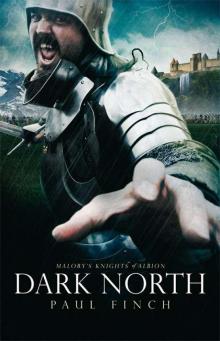 Dark North mkoa-3
Dark North mkoa-3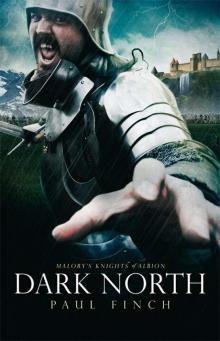 Dark North (Malory's Knights of Albion)
Dark North (Malory's Knights of Albion) a collection of horror short stories
a collection of horror short stories Sacrifice
Sacrifice Kiss of Death
Kiss of Death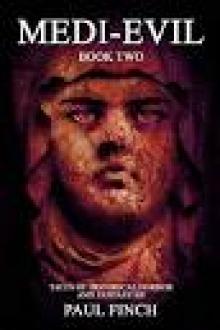 Medi-Evil 2
Medi-Evil 2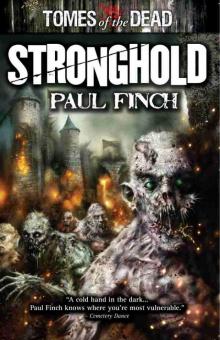 Stronghold
Stronghold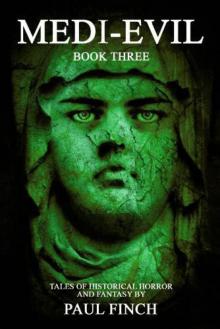 Medi-Evil 3
Medi-Evil 3 Dead Man Walking
Dead Man Walking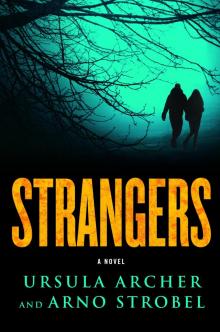 Strangers
Strangers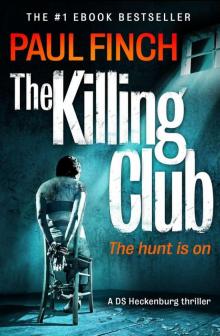 The Killing Club
The Killing Club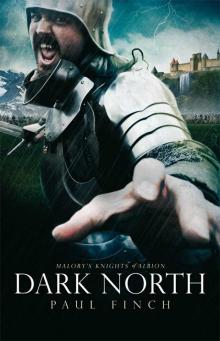 Dark North
Dark North A Wanted Man
A Wanted Man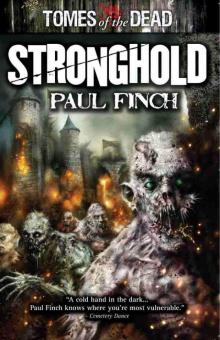 Stronghold (tomes of the dead)
Stronghold (tomes of the dead) Hunted
Hunted Cape Wrath
Cape Wrath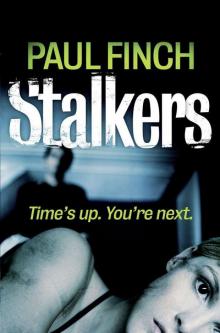 Stalkers
Stalkers The Burning Man
The Burning Man Medi-Evil 1
Medi-Evil 1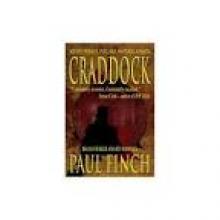 Craddock
Craddock Hunted (Detective Mark Heckenburg Book 5)
Hunted (Detective Mark Heckenburg Book 5)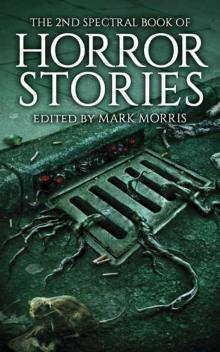 2nd Spectral Book of Horror Stories
2nd Spectral Book of Horror Stories The Chase
The Chase